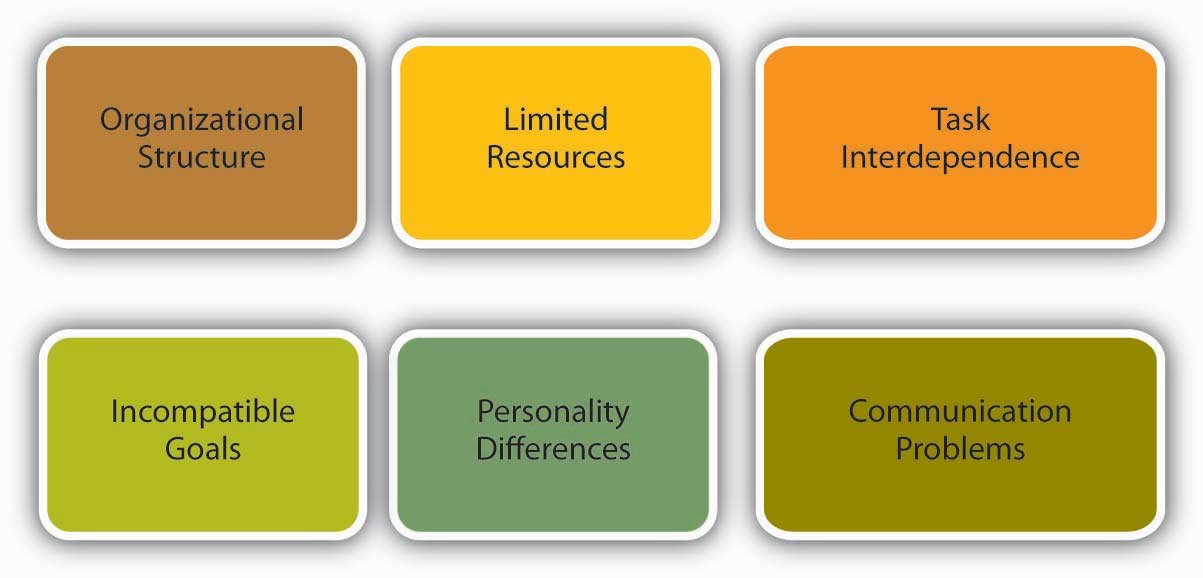.png)
Causes & Types of conflict

Conflicts can arise due to a variety of reasons, some of which are:
Differences in values: Conflicts can arise when people have different values, beliefs, or opinions.
For example, a conflict can arise between two co-workers if one believes in working overtime to finish a project while the other believes in maintaining work-life balance.
Limited resources: Conflicts can arise when there is a limited number of resources, such as money,time, or equipment.
For example, if there is a limited budget for a project, a conflict can arise between team members who have different ideas on how to allocate the funds.
Miscommunication: Conflicts can arise when there is a breakdown in communication.
For example, if a manager does not clearly communicate the expectations for a project, team members may have different interpretations of what is expected of them, leading to conflict.
Personal issues: Conflicts can arise due to personal issues, such as jealousy, ego, or insecurities.
For example, a conflict can arise between two team members if one is jealous of the other's success or if one has a bigger ego than the other.
Power struggles: Conflicts can arise when there are power struggles, such as when one person wants to have more control or authority than others.
For example, a conflict can arise between two managers who both want to be in charge of a project.
Unresolved past issues: Conflicts can be fueled by past issues or grudges that have not been resolved.
For example, A co-worker constantly belittles another co-worker because they had a past disagreement that was never resolved.
External factors: Sometimes, conflicts can arise due to external factors, such as changes in laws,regulations, or societal norms.
For example, A group of citizens protests against a new law passed by the government that they disagree with.
Cultural differences: Conflicts can arise when people from different cultural backgrounds have different expectations or beliefs that clash.
For example, A foreign employee is criticized by their American colleagues for being too direct and not respecting hierarchies.
Goals and objectives: When individuals or groups have different goals or objectives, it can lead to conflicts as each party seeks to achieve their own desired outcomes.
For example, A group of politicians disagree on how to address a particular issue, with each pushing for their own objectives.
Organizational factors: Conflicts can be caused by issues within an organization such as management style, policies, and procedures.
For example, an employee feels discriminated against due to the company's policies that appear to favour a certain group.
It is important to identify the causes of conflicts in order to effectively manage them. By understanding the root causes of a conflict, it is possible to address them directly and find solutions that work for everyone involved.
Types of conflicts
Interpersonal conflict:This is a conflict that arises between two or more individuals.
Examples: Conflicts between co-workers or family members.
Tactics: It's important to listen actively, communicate clearly and calmly, and seek to understand the other person's point of view.
Recommendations: Practicing active listening techniques, learning how to give and receive constructive feedback, and improving communication skills.
Intrapersonal conflict: This is a conflict that arises within an individual, often dueto a discrepancy between their beliefs or values and their behavior.
Examples: Conflicts related to work-life balance or personal goals.
Tactics: Reflect on one's own beliefs and values, identify the source of the conflict, and develop a plan to align behavior with these values.
Recommendations: activities to improve self-awareness, goal-setting exercises, and time management strategies.
Organizational conflict: This is a conflict that arises between different departments or groups within an organization, often related to differences in goals, priorities, or communication styles.
Example: Conflicts between management and employees, or between different teams within a company.
Tactics: It's important to foster open communication, encourage collaboration, and seek to understand the concerns of all parties involved.
Recommendations: Team-building exercises, training on effective communication and conflict resolution skills, and leadership development.
Societal conflict: This is a conflict that arises between different social groups, often related to differences in values, beliefs, or cultural backgrounds.
Example: Conflicts related to politics, religion, or social issues.
Tactics: To manage societal conflict, it's important to engage in respectful dialogue, seek to understand the perspectives of all parties involved, and work towards finding common ground.
Recommendations:Training on intercultural communication and diversity and inclusion, Resources for developing empathy and understanding for different viewpoints.